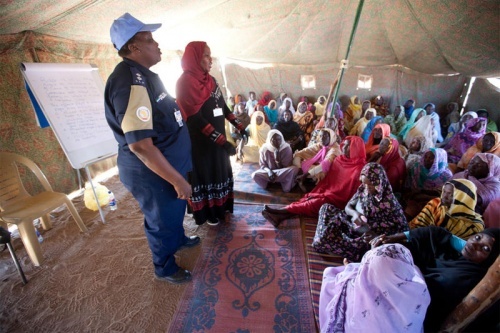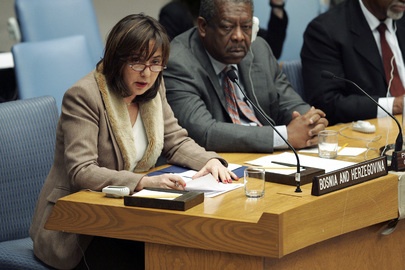

UN Security Council held debate on how women can contribute to UN’s peace efforts consistent with Resolution 1325 adopted in 2000. (That Resolution demanded measures to reverse the egregious and inhumane treatment of women and girls during conflicts, the denial of their human rights and their exclusion from decision-making in situations of armed conflict, in peacemaking and peacebuilding).
Set of Recommendations Adopted:
As a consequence of this week’s debate, a Presidential Statement was adopted unanimously and the UNSC took note of the analysis and recommendations in the Secretary-General’s report on women and peace and security on progress in implementing commitments on women and peace and security, including on the representation and participation of women in decision-making forums, institutions and mechanisms related to the prevention and resolution of armed conflict and to peacebuilding.
Need for Greater Measues Still:
The UNSC though also voiced concern that there were “persistent gaps and challenges that seriously hinder the implementation of [the resolution],” including what it saw as continued low numbers of women in formal institutions of conflict prevention, especially in preventive diplomacy and mediation efforts. It therefore not only stressed the need to bolster the role of women in such institutions and fields, but also incorporating the gender perspective into United Nations field missions. (One such area is greater women participation as peacekeepers/UN police: (See FILM REPORT – “Why Women Peacekeepers”
diplomaticallyincorrect.org/films/movie/why-women-peacekeepers/25903
UN Women:
The role of the new UN agency “UN-Women” was also welcomed in implementing Resolution 1325. The UNSC also noted positively the increased coordination and coherence in policy and programming for women and girls within the United Nations system since the creation of the gender entity. (See FILM REPORT – “UN Women” -
diplomaticallyincorrect.org/films/movie/un-womenfrom-to/25110 ).
International Criminal Court & Fight Against Impunity:
Fighting against impunity for serious crimes committed against women and girls had been strengthened through the work of the International Criminal Court, ad hoc and mixed tribunals, as well as specialized chambers in national tribunals, the Council reiterated its intention to enhance its efforts to fight impunity and uphold accountability for serious crimes against women and girls with appropriate means. (See More at “War Crimes Justice” Channel -
diplomaticallyincorrect.org/c/war-crimes-justice
Women in Work of Council & Further Review by 2015:
The UNSC also reiterated its call to increase the equal participation, representation and full involvement of women in preventive diplomacy efforts. It also reiterated the need to support, as appropriate, local women’s peace initiatives, processes for conflict resolution and initiatives that involved women in implementation mechanisms of the peace agreements, including through the local-level presence of United Nations field missions. The UNSC also recognized need for more systematic attention to and implementation of women and peace and security commitments in its own work, and expressed its commitment to ensure that measures to enhance women’s engagement in conflict prevention, resolution and peacebuilding would be advanced in the Council. (Top PHOTO – women to women in Darfur). It also committed to convene a high-level review in 2015 to assess progress at the global, regional and national levels in implementing resolution 1325 (2000), renew commitments and address obstacles and constraints that had emerged in the resolution’s implementation.
Repeatedly Marginalized:
The Debate involved more than 60 national representatives as well as UNSG Ban Ki-moon and Director for UN Women Michelle Bachelet. The President of the Economic and Social Council, Lazarous Kapambwe of Zambia, who also called on the UN system to develop a more coherent response to end all forms of discrimination and violence against women and girls, with special attention to the linkage between HIV/AIDS and sexual violence. (READ – “Ambitious Goals to Overcome HIV/AIDS” -
diplomaticallyincorrect.org/films/blog_post/ambitious-goals-to-overcome-hivaids-by-ambassador-mo/28870 ). Finally, also briefing the UNSC, was Orzala Ashraf Nemat, of the Non-Governmental Organization Working Group on Women, Peace and Security. She reiterated what one might gather as the theme of the day: implementation of resolution 1325 (2000) was “highly uneven”, particularly in regard to its call to increase the representation of women at all decision-making levels in national, regional and international institutions and mechanisms from the prevention, management and resolution of conflict. “It is particularly frustrating that we are repeatedly marginalized.”
(Bottom PHOTO – Mirsada Colakovic – Deputy Ambassador – Permanent Representative of Bosnia & Herzegovina – one of handful of women diplomats on UN Security Council)
By Ambassador Muhamed Sacirbey
FaceBook – Become a Fan at “Diplomatically Incorrect”
Twitter – Follow us at DiplomaticallyX
More at “War Crimes Channel” -
diplomaticallyincorrect.org/c/war-crimes-justice



